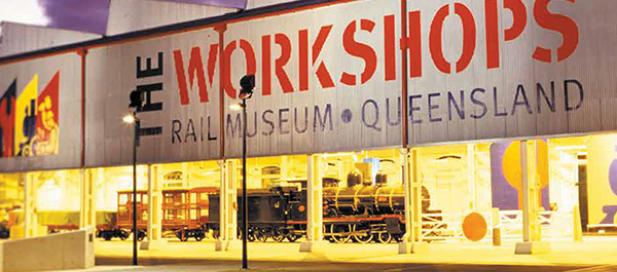
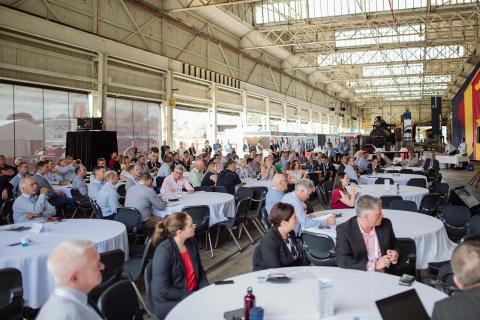
Last week, Commissioner for Environmental Sustainability Dr Gillian Sparkes attended the Future Waste Resources Convention at the Workshops Rail Museum in Ipswich, Queensland which brought together around 250 people (and lots of trucks, compactors and other kit!) from across the waste industry, along with state and local government representatives from all over QLD and as far away as Cape York. In this article, originally posted on Linkedin, she discusses this key industry event.
"The atmosphere was fantastic – lots of goodwill, great ideas, so practical and solutions focused! The timing of the Convention was serendipitous for the Australian waste sector given it coincides with QLD reintroducing a waste levy and was an important opportunity for QLD to bring leaders from industry, government and community together to share ideas and lessons from our collective experiences.
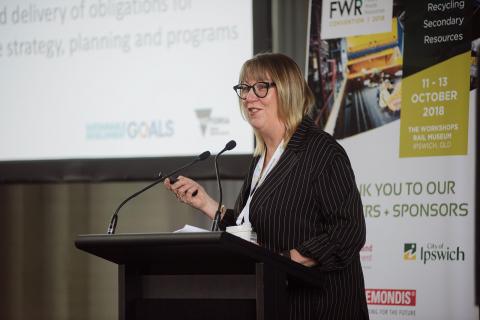
I was invited by the organisers to speak on “The role of a statutory body in delivering waste policy successes” and share insights from my experiences and multiple perspectives – primarily in my role as Victoria’s Commissioner for Environmental Sustainability preparing the waste chapter for the 2018 Victorian State of the Environment Report and also as a former Chair of Sustainability Victoria (SV) and (a long time ago!), Branch Manager for Cleanaway (Brambles).
Preparing the presentation for this event was fun – I enjoyed the opportunity to once again reflect on SV’s important role in statewide waste and resource recovery strategy, planning and program delivery. Including the development of Victoria’s inaugural Statewide Waste and Resource Recovery Infrastructure Plan initiated during my time as Chair of Sustainability Victoria, and the 7 regional plans (WRRIPs) that have subsequently been developed through a lot of hard work by many people.

It was pleasing to note strong support for Victoria’s statewide waste and resource recovery infrastructure plan. In fact, Queensland indicated they will adopt this model which, on a personal level, is great to see. There is no need to reinvent the wheel and WRIQ brought many experienced practitioners together at the Convention last week with that goal in mind. It was refreshing to hear for example, the pragmatic approach presented by Queensland Treasury Corporation’s Tony Donegan that he and colleagues have undertaken to seek out government counterparts from other States and pick the best ideas for delivering waste policy success in their State. Tony mentioned that Victoria and South Australia were particularly enlightening. There really are no silver bullets so learning from each other, sharing our experiences good, bad, indifferent, is so important. Well done WRIQ on designing a clever, engaging and informative program.
In my address, I reiterated the importance of a statutory authority and the need for role clarity and delineation of accountabilities but coupled with collaboration in execution, between statutory agencies. It’s a tricky balance. Myself and others discussed the importance of delivery architecture from policy and plans top down to bottom up, and the critical role of local government representing the needs of their communities. Effective delivery of waste policy for communities is a multi-agency task. There is a long chain of stakeholders in delivering waste policy success – from State Government agencies such as Sustainability Victoria in Victoria to regional Waste groups and of course Local Governments, communities (behaviours, choices, actions), regulators, social enterprises and the ‘for profit’ industry and service providers. It was heartening to experience the genuine engagement by all stakeholders at FWR2018 in Ipswich – everyone I spoke with was authentic in their desire to listen and learn from the experience of others. I left feeling that my time had been well spent, that Queensland has a strong commitment to getting their waste management and resource recovery system working properly, including reintroducing the levy – an important outcome for Victoria.
My key takeaways:
-
There’s no silver bullet.
-
Waste management and resource recovery are not a ‘set-and-forget’ function for government.
-
Stakeholders must think and act operationally.
-
Good governance is critical for maintaining social licence.
-
This is an innovative sector across the board that is enthusiastic and focused on problem solving.
Victoria has come a long way with our waste and resource recovery planning and agency architecture since my introduction to #SV’s predecessor, EcoRecycle in the nineties. We have plenty of lessons to share and stories to tell. We are also Australia’s fastest growing State, so we are not complacent about the challenges and opportunities ahead.
A reflection for me is that when it comes to an effective waste and resource recovery system, “SYSTEM”, is the operative word – that and the criticality of good governance, were two key messages from me at #FWR2018 to those designing the architecture that will deliver successful waste and resource recovery outcomes for their communities. Agencies and plans being aligned with inbuilt agility and redundancy to enable adaptation and timely responses as settings and circumstances change, produce better outcomes.
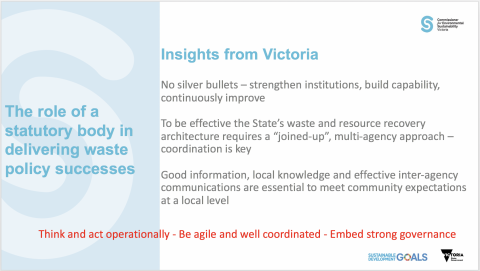
My team and I speak often about our “Leadership, Commitment, Action” model for reform. Waste management and resource recovery is no different. A waste levy is an important lever - and there are many others that can impact and indeed transform system operation - planning, procurement, market development, education, regulation and investment prioritisation. Fit for purpose statutory authority/s underpin the system.
Transitioning to a circular economy was also a hot topic of discussion at #FWR2018. In July 2018 Victoria launched the Recycling Industry Strategic Plan. It is a blueprint for a future recycling system and pleasingly, commits Victoria to a circular economy policy by 2020 – setting the scene to bring the many levers of government together under a coherent policy framework. Access to good, timely information, local knowledge and effective inter-agency coordination, collaboration and communication will always be essential to enable those levers to successfully deliver waste policy success and meet the needs and expectations of communities.
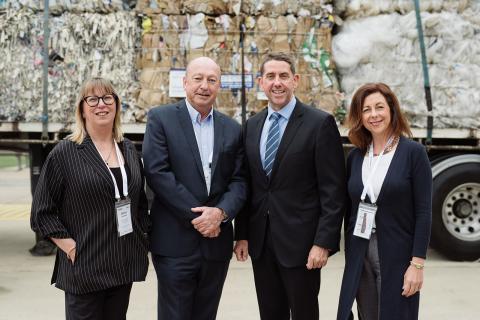
Congratulations and thanks go to Waste Recycling Industry Association of Queensland CEO Rick Ralph, WRIQ (above, second from left), Jennifer Howard, Member for Ipswich (above, right), other event organisers and fellow speakers for a successful and energising #FWR Convention that was officially opened by Queensland’s Environment Minister Leeanne Enoch. #FWR2018 speakers included Queensland Minister for State Development Cameron Dick (above, second from right), UK resources industry advocate and former Director of Policy and Evaluation for the UK Government’s Waste and Resources Action Programme (#WRAP) Ray Georgeson; General Manager – Reconomy for Downer, Jim Appleby, Queensland government’s Director of DSDMIP’s Biofutures Sectoral Team Michae lBurke; Professor of Resource Futures at Institute for Sustainable Futures, UTS Damien Guirco; National Waste and Recycling Industry Council’s Rose Read; FNQ Plastics co-owner Lesley van Staveren; WMAA CEO Gayle Sloan; MRA Principal Mike Ritchie and Alex Fraser GM Sean McCormick.
Photos: Paul Benjamin
